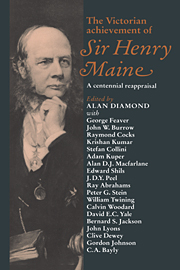Book contents
- Frontmatter
- Contents
- Notes on contributors
- Foreword by Sir John Lyons
- Introduction
- 1 The Victorian values of Sir Henry Maine
- PART 1 MAINE AND THE IDEA OF PROGRESS
- PART 2 MAINE AND THE SOCIAL SCIENCES
- PART 3 MAINE ON LAW, LEGAL CHANGE AND LEGAL EDUCATION
- 11 Maine and legal education
- 12 Maine and legal education: a comment
- 13 A wake (or awakening?) for historical jurisprudence
- 14 Further thoughts on Maine's historical jurisprudence
- 15 Fictions, equity and legislation: Maine's three agencies of legal change
- 16 Law and language: a metaphor in Maine, a model for his successors?
- 17 Linguistics and law: the legacy of Sir Henry Maine
- PART 4 MAINE AND INDIA
- Appendix: the conference programme
- Bibliography
- Index
17 - Linguistics and law: the legacy of Sir Henry Maine
Published online by Cambridge University Press: 04 September 2009
- Frontmatter
- Contents
- Notes on contributors
- Foreword by Sir John Lyons
- Introduction
- 1 The Victorian values of Sir Henry Maine
- PART 1 MAINE AND THE IDEA OF PROGRESS
- PART 2 MAINE AND THE SOCIAL SCIENCES
- PART 3 MAINE ON LAW, LEGAL CHANGE AND LEGAL EDUCATION
- 11 Maine and legal education
- 12 Maine and legal education: a comment
- 13 A wake (or awakening?) for historical jurisprudence
- 14 Further thoughts on Maine's historical jurisprudence
- 15 Fictions, equity and legislation: Maine's three agencies of legal change
- 16 Law and language: a metaphor in Maine, a model for his successors?
- 17 Linguistics and law: the legacy of Sir Henry Maine
- PART 4 MAINE AND INDIA
- Appendix: the conference programme
- Bibliography
- Index
Summary
INTRODUCTION
The title of my contribution, it will be noted, is slightly, though significantly, different from that of Professor Jackson's. I have reversed the order of the two keyterms, putting the word ‘linguistics’ before ‘law’, in order to reflect the fact that I, in contrast with him (and with Maine himself), am looking at the issues, not with the eyes of a lawyer, but with those of a linguist: i.e. with those of a professional student of language. And I have used ‘linguistics’ rather than ‘language’, partly to reinforce this fact, but also to eliminate certain troublesome ambiguities associated with the word ‘language’ in English.
The linguist, nowadays, finds it essential to draw a clear distinction, conceptually, if not always terminologically, not only between language and the study of language, but also between different senses of the word ‘language’ (construed generically), between language (in these several senses) and languages, and between language and the use of language (or the products of the use of language). My substitution of ‘linguistics’ for ‘language’ is associated with the adoption of a particular, late twentieth-century, theoretical framework within which the distinctions to which I have referred find their place (see Lyons, 1981a). Maine himself, of course, employed the characteristically nineteenth-century term ‘philology’, rather than ‘linguistics’. Nowadays, ‘linguistics’ is generally taken to be the broader term; and ‘linguistics’, quite rightly, is the term that Jackson uses in the second part of his chapter.
- Type
- Chapter
- Information
- The Victorian Achievement of Sir Henry MaineA Centennial Reappraisal, pp. 294 - 350Publisher: Cambridge University PressPrint publication year: 1991
- 1
- Cited by

